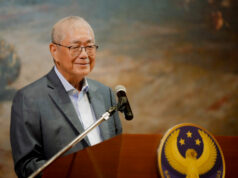Work performance review guide for the New Year
I had a roller-coaster ride with our supervisors and employees this past year. About 37 (out of 53) of my workers failed to meet their respective targets, which also reflects badly on my work performance as a department head. Top management has given me a last chance to improve our work this coming year, except that I don’t know where to start. From the time that I assumed this post two years ago, my work is dominated by many fire-fighting activities, mostly correcting errors by workers who are not qualified to do their jobs. Can you help me with some ideas that we can use for the New Year? — Back to Basics.
There’s an old story about a scorpion and a frog that could help us understand your work relationship with people. The scorpion wanted to cross the pond to discover other opportunities elsewhere. Knowing that it could not swim, he talked to a frog and begged for his help: “Please, Mr. Frog. Can you help me cross the pond? I can ride on your back and you can carry me to the other side.”
The frog resisted: “I’m sorry, Mr. Scorpion. I must decline your request as you might sting me as we swim across.”
“Why would I do that?” asked the scorpion. “It’s not in my interest to do just that. If I stung you to death, then I will die by drowning.” The frog was convinced by the logic of the scorpion. And so they agreed. The scorpion climbed into the frog’s back, and together they set off across the pond.
In the middle of the pond, the scorpion failed to control himself and stung the frog, who immediately cried in pain: “Why did you sting me? Now, both of us are going to die.” As they both sank, the scorpion uttered his last words: “I’m very sorry. I’m a scorpion and I can’t control myself. I must sting you to death as it’s my nature to sting, no matter the circumstance is.”
Many command-and-control managers think like the scorpion. Most of the time, managers think it’s their nature to directly control the actions of their workers to do what they can so they can reach their performance target. The trouble is that these managers can’t control themselves. They believe they know everything and the workers have no choice but to follow their dictates.
Indeed, as a manager it is your responsibility to direct your workers. But that’s only possible if the workers are consulted on the best way to do the job. You can devise reasonable office rules and standard policies to control the workers’ possible unruly inclinations. However, before you can do that, you need the workers’ ideas to make things possible under the principle of co-ownership and shared responsibility.
The words employee empowerment and engagement explain everything, no matter how trite they may have become. If you do it without serious thinking, chances are your efforts will simply go to waste. Besides, you can’t simply apply it to all workers who have different inclinations and needs, depending on where they are coming from.
And so, what can we learn from great managers? If you Google that question, you’ll be directed to the work of Marcus Buckingham in his March 2005 article “What Great Managers Do?” as published by the Harvard Business Review. Buckingham says “there is one quality that sets truly great managers apart from the rest: They discover what is unique about each person and then capitalize on it. Average managers play checkers, while great managers play chess.
“The difference? In checkers, all the pieces are uniform and move in the same way; they are interchangeable. You need to plan and coordinate their movements, certainly, but they all move at the same pace, on parallel paths. In chess, each type of piece moves in a different way, and you can’t play if you don’t know how each piece moves.”
Buckingham uses this argument based on his Gallup-supported research involving 80,000 managers. In playing chess with your workers, he says in First, Break All the Rules (2005) which he coauthored with Curt Coffman, you have to answer the following questions: “Do I know what is expected of me at work? Do I have the materials and equipment I need to do my work right?
At work, do I have the opportunity to do what I do best every day? In the last seven days, have I received recognition or praise for good work? Does my supervisor, or someone at work, seem to care about me as a person? And lastly, is there someone at work who encourages my development?”
Pretty basic, huh? But nothing can happen if you don’t explore these questions with your own boss. And of course, these same set of questions should be answered by all workers under your command.
In closing, let me focus on your statement that you’re preoccupied mainly correcting employee errors. Allow me to quote once again Buckingham and Coffman: “(I)t is tempting to believe that some roles are so simple that they don’t require talent. Hotel housekeepers, outbound telemarketers, and hospital service workers are all examples of roles that conventional wisdom suggests ‘anyone can do.’
“Misled by this wisdom, many managers don’t bother selecting for people who have talent for these roles. They hire virtually anyone who applies. Consequently they end up with a hopelessly miscast work force.” You can’t blame the human resources department on this, as I’m sure that your department had the ultimate decision in choosing the best workers for your own needs.
Once again, change your mind-set of being a scorpion whose nature is to sting people. Otherwise, you’ll drown with the frog.



